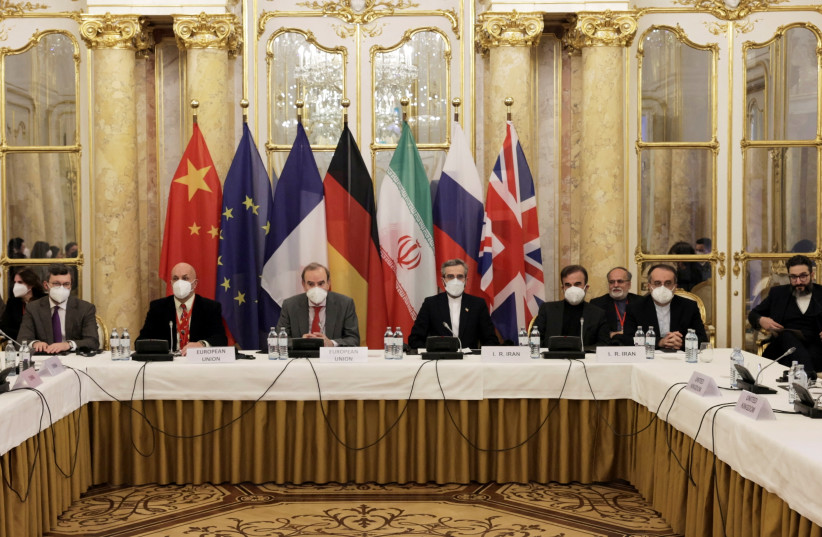One thing Iran’s spin doctors have not been during the current nuclear negotiations is coherent.
There have been contradictory messages expressed – sometimes on the same day and certainly in the same week.
The confusion has increased with aggressive Iranian actions, like its satellite launch last weekend (which could double for advancing toward longer-range, ballistic-missile capabilities) and its proxies targeting US bases in Iraq twice in 24 hours on Monday.
Another major message on Monday came from Iranian President Ebrahim Raisi, who demanded that the US hand over former US president Donald Trump and former US secretary of state Mike Pompeo for their roles in ordering the assassination of IRGC Quds Force commander Qasem Soleimani in January 2020.
So is all of this part of messaging for holding a hardline position in the nuclear talks in Vienna, or is it trying to notch achievements and proclaim last victories before setting the stage for cutting a deal with the West that it has said it would not cut?

Since nuclear talks came back in late November, the Islamic Republic on an almost daily basis puts out statements assuring its people and the world that it is winning and that all of the negotiations are focusing on lifting sanctions.
There is nothing about nuclear limits, and it is dead set against an interim deal to slow or freeze its nuclear progress for some partial sanctions relief.
But if this was Tehran’s full game plan, why do its negotiators also constantly give upbeat reports on positive progress with the world powers at the same time that the US and the EU-3 (England, France and Germany) condemn the regime as putting forth unrealistic positions?
If it just wanted to play hardball, then it could point to the West’s negative statements and walk away from the table.
Apparently, there is something more complex going on.
In fact, Iran in past negotiations has sworn it would never do an interim deal, only to do just that.
The 2015 JCPOA was preceded by the 2013 JPA, which was some version of the partial sanctions relief for a partial nuclear-limits formula, along with a framework for future negotiations.
So it seems that even if Raisi has mixed feelings about returning to the JCPOA and wants to try to maintain some of the nuclear advances he has achieved, he also wants some things from the negotiations.
What he wants might include reducing the economic pressure, mitigating pressure from the IAEA and attaining some diplomatic cover from the West to dissuade Israel from either covert or overt military operations.
For example, even in a “less for less” deal with partial nuclear limits on Iran for partial sanctions relief, it will become harder for Jerusalem to take independent action against the Islamic Republic than it has been for the last 18 months when the regime was an open nuclear violator.
An eye needs to be kept on South Korean officials who are reportedly engaging with negotiators in Vienna during the coming week. This could be a sign of unfreezing around $7 billion in Iranian assets frozen by South Korea at the urging of the US.
Although there were multiple rumors of these assets being unfrozen in the past, including as a possible sweetener to get Iran back to the negotiating table this past April, the assets remain frozen and available as a bargaining chip of partial sanctions relief.
Another eye should be focused on Tehran’s obsession with Trump. Reviewing Iranian media, there are often more stories about him – as though he were still president – than the US’s actual current president and commander in chief, Joe Biden.
One story in Iranian media on Tuesday noted a poll showing Trump ahead of Biden should the two face off against each other in a 2024 rematch of 2020.
Incidentally, there are polls showing each of the two men leading, so it was not a coincidence that the regime highlighted only the poll of Trump leading.
Iran and Raisi are terrified of Trump or a Trump-like, vehemently anti-Iranian Republican returning to the presidency.
They do not want to give up too much of their nuclear future for economic relief, which may never fully play out (even before Trump, many Western businesses refused to invest in Iran, due to charges of bribery and corruption) or be cut off in a couple of years.
In fact, the most likely scenario is that the Islamic Republic itself has not decided its endgame.
This past month’s and even the current negotiations all seem to be testing whether the US and EU really will pull out of the talks and enter a more confrontational phase.
It will probably only be when Raisi is convinced that the US and EU are on the verge of confrontation that we will know whether all along he wanted a deal and was just holding out for as many concessions as possible, or whether the eight rounds of talks were all to play for time in order to get closer to the nuclear threshold.
